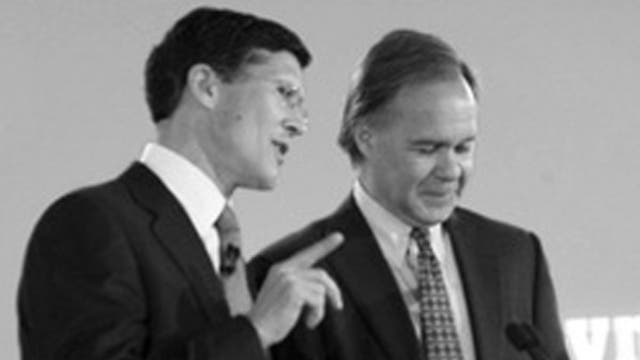Values: Not Always a Money Term on the Street
The biggest lesson from his nearly three decades on Wall Street isn’t the best way to save a couple bucks, or the top ten ways to smooth talk potential buyers. Instead, Win Smith, former executive vice president of Merrill Lynch, said the most important thing he learned is to possess strong personal values and a solid set of principles.
“I’ve worked for some tremendous leaders over time and what I learned is it’s far less about the technical skills they had -- it was about their character, their values, their humanity,” Smith said.
Smith’s story, though, doesn’t start with his first job on the Street.
Raised by Mother Merrill
To understand Smith you have to first understand Merrill Lynch and his family’s intertwined history.
The investment bank was a storied one on Wall Street. That is before the 2008 financial crisis brought the brokerage to its knees, leading to Bank of America’s (NYSE:BAC) acquisition of the firm.
Smith’s father, Winthrop Smith, began his career with Merrill just two years after its founding. He became the “Smith” in the firm’s official name, Merrill Lynch, Pierce, Fenner & Smith when he signed on as one of its founding partners. Smith Sr. continued his career with the firm, mentored by Charlie Merrill himself. Smith was also credited with helping to bring Wall Street to Main Street for more than four decades until he handed over the brokerage’s daily operations in the late 1950s.
Some 30 years later, Smith’s son joined the firm.
Some think it natural for a son to follow in his father’s footsteps, but Smith said it didn’t go exactly that way.
“(My father) died when I was fairly young, when I was 11,” he said. “So I’m not sure I really knew what my dad did until I started working (at Merrill) quite a while later. And I learned so much about my father from the stories that people told me. He was really held in great admiration, great affection.”
There’s no question the Smith family has left an indelible mark on the Merrill Lynch legacy, and similarly, there’s no doubt the firm has left an equally permanent mark on the family.
For Smith, Merrill Lynch was more than just a platform for money to change hands – instead, it was where people came together. Mother Merrill, as it’s called, was the culture represented by understanding and respect, and a sense of community and integrity among those who worked for the firm and its clients.
“Those of us who worked for Merrill Lynch in those days, we were so proud to be part of that organization. It was more than just a job. It was a family,” Smith said.
A Loss of Direction
In 2002, Smith faced a decision after he was passed over for the chief executive job: Continue on with the firm he loved, or walk away due to a deep divide over values and direction.
Smith chose to walk away.
It wasn’t a planned decision. Nor was it one he ever wanted to make. But, as he details in his book “Catching Lighting in a Bottle,” it was one he felt was morally right for himself.
“I really would not have held up to my values and principles had I stayed," he said. "So at that moment in time, it was the right decision.”
It came after the fall of 2001 when Smith was asked to remain at Merrill as vice chairman. He said he wanted to stay on board. But a fateful meeting with then-CEO Stanley O’Neal was cause for a change of heart. Profound disagreements between the two executives led Smith to leave the firm once named for his father.
"I wanted to stay. My heart said stay. But I knew I could not ... That was the day I never thought could happen,” he said.
Moving Toward a Valuable Future
Shortly after leaving the world of investment banking, Smith decided to delve deep into the hospitality industry when he invested in Sugarbush, a ski resort in the mountains of Vermont. It’s a partnership investment in which he is the majority owner.
Before purchasing the resort, Smith said he felt it was an adventure and a challenge he looked forward to. The resort had fallen into disrepair and where others might have seen too much work, he saw opportunity to renovate.
"I love skiing so I always believed that the most important thing is that you get up in the morning, and you love what you’re doing, passionate about what you’re doing, and so this has becoming an actually really fun and wonderful second career for me,” he said.
He’s enjoying his life and the new opportunities ahead, but would he ever consider another career on the Street?
Not a chance.
“It’s that old saying: You can never go home again. But I keep my toe in the water. I’m the director of four financial firms so that way I’m still involved without being there day-to-day.”
For those, though, who do find themselves at the intersection of Wall and Broad, or aspire to one day find themselves there, Smith offers advice.
“If you’re working on Wall Street the most important thing is do what’s right for your client. Live a set of values and principles and understand you can make a difference in people’s lives. Don’t’ abuse that trust they’re giving you,” he said.




















